ODESA, Ukraine — On Sept. 22, activist Oleg Mykhailyk was walking home in Odesa when he felt a burning pain in his chest. He was shot. Mykhailyk managed to walk another 100 meters to his home. Before losing consciousness, he asked neighbors to call an ambulance. Doctors had to resuscitate him in the hospital.
More than a month later, the bullet is still lodged in Mykhailyk’s left lung. It pierced his arm and a rib, but didn’t reach the heart. Police arrested three suspects, but Mykhailyk remains fearful. He wears a bulletproof vest when he leaves home and is accompanied by state-provided bodyguards.
He believes someone wanted to kill him because of his activism against illegal construction in Odesa. He also believes that local authorities either ordered the shooting or know who did.
“I’ve never had and don’t have any conflicts besides those with groups directly linked to the city authorities of Odesa, including its mayor,” a weak and pale Mykhailyk, 45, told journalists outside his house on Oct. 5.
Mykhailyk is one of at least 14 civic activists who have been attacked this year in Odesa, the southern Black Sea port city of 1 million residents located 475 kilometers south of Kyiv.
The attacks have prompted international outrage.
On Sept. 22, the U. S. Embassy in Ukraine responded to the attack on Mykhailyk. “Such attacks are becoming all too common and must stop. He and the people of Ukraine deserve a quick, transparent, and thorough investigation,” the embassy wrote on Twitter.
On Oct. 29, Delia Ferreira Rubio, chairwoman of Transparency International, urged Ukraine’s authorities to “take strong action” against the perpetrators.
The Kyiv Post interviewed seven of the victimized activists. They are people with different occupations who represent different organizations. But they all have one thing in common: They have criticized Mayor Hennady Trukhanov and his municipal administration.
They say that Trukhanov, who has run the city since 2015, is a crony of shady businessmen Alexander Angert and Vladimir Galanternik. Trukhanov admits to being friends with Angert and Galanternik, but has repeatedly denied having any links to corruption or criminality.
However, an Italian police dossier from 1998 identifies Trukhanov and Angert as members of a mafia gang. It was published by the Organized Crime and Corruption Reporting Project, a Kyiv Post partner, in 2016.
An April 23, 2018 report by the BBC, citing documents from the Paradise Papers — a massive leak of documents exposing offshore companies serviced by the Appleby law firm — said the trio operated as part of a criminal gang implicated in murder as well as smuggling arms and drugs in Odesa as far back as the 1990s.
Today, local anti-corruption activists say Angert, the alleged ringleader, along with Galanternik and Trukhanov, have turned Odesa into their private fiefdom, awarding the most lucrative land and municipal contracts to their own companies.
Trukhanov’s press service refused to respond to accusations of involvement in attacks on activists in Odesa and allegations of corruption.
The head of the press service, Natalia Maltseva, dismissed the Kyiv Post’s request for comment, saying the activists who suffered the attacks also criticized construction by the KADORR Group, an Odesa development company owned by Kyiv Post publisher Adnan Kivan.
Several activists indeed criticized KADORR’s construction in Odesa’s downtown, but none of them believe Kivan has anything to do with the attacks on them. In July, Trukhanov’s press service told the Kyiv Post that they “don’t comment on opinions” when asked about Trukhanov’s involvement in earlier attacks on activists.
The Kyiv Post was unable to reach either Angert or Galanternik, both notoriously publicity-shy, for comment on accusations made against them.
Activists claim that Odesa, the picturesque city of 19th century architectural gems located on Ukraine’s sunny southern coastline, is being ruined by chaotic construction and that the $355 million city budget is being misused by Trukhanov’s cronies.
Activists who speak against the mayor say they don’t feel safe in Odesa, don’t trust the police, and think law enforcement is not looking for those who ordered the attacks.
They also believe the central authorities in Kyiv are turning a blind eye to criminality in the city in exchange for the mayor’s support for the re-election of President Petro Poroshenko in March.
“There will be more attacks like this closer to the elections,” Mykhailyk said, referring not only to the upcoming presidential contest, but also to parliamentary elections in October 2019.
Oleg Mykhailyk
Mykhailyk doubts that the three petty criminals police arrested on Sept. 25 were actually involved. The bullet that remains lodged in his chest could help identify the gun used, either proving the suspects’ guilt, or confirming their alibi.
But his distrust in the authorities is so strong that he is afraid of having the bullet removed, because he thinks it can be switched for another one. The activist’s friends plan to send him abroad for the bullet extraction.
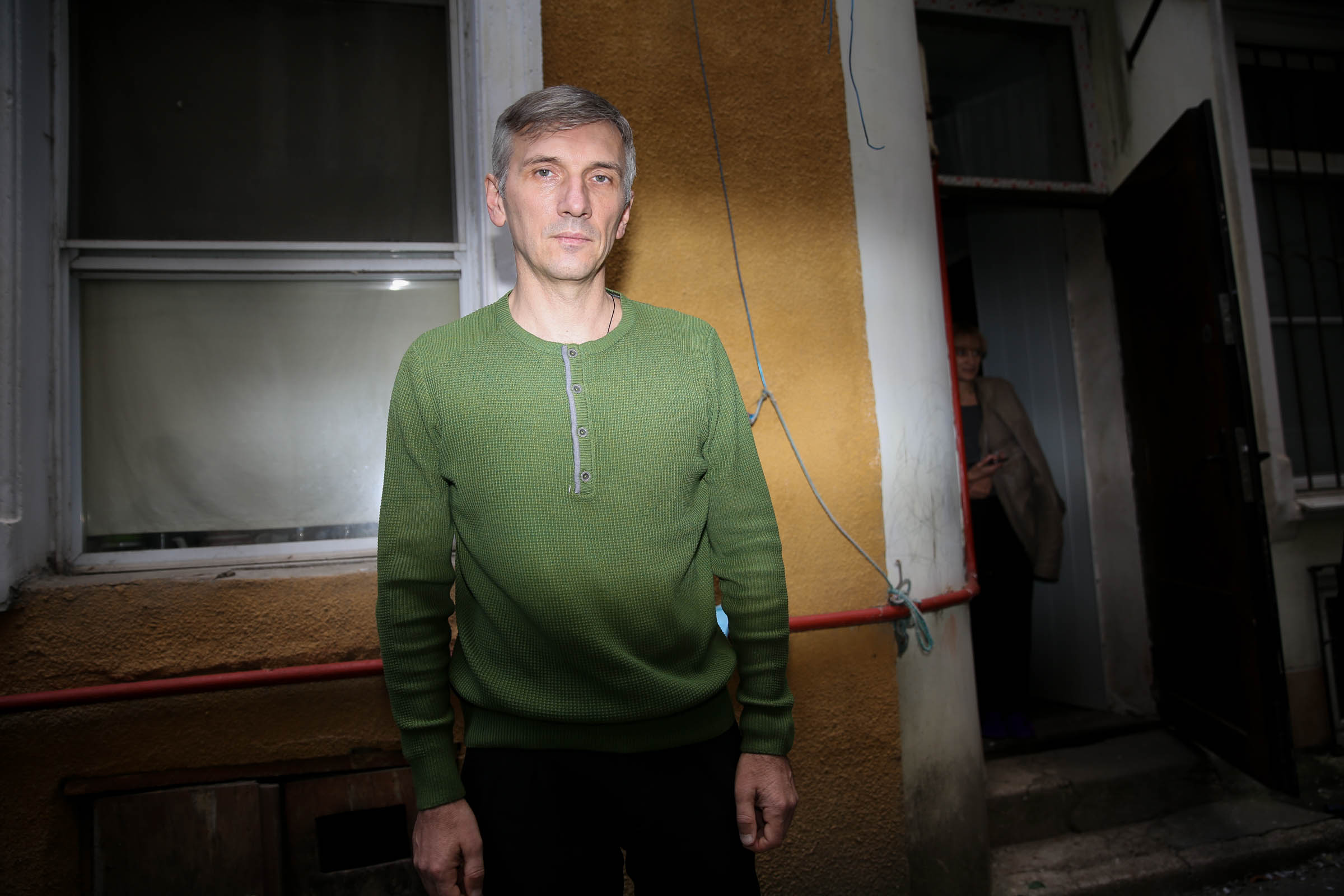
Oleg Mykhailyk, the head of the Odesa branch of the Syla Liudey party, stands by his house in Odesa, near which he was shot on Sept. 22. (Kostyantyn Chernichkin)
A former sailor, Mykhailyk runs a small family business installing surveillance cameras. He also heads the Odesa branch of the Syla Liudey (Power of People) political party, and has announced he plans to run for mayor in the next elections, scheduled for 2020.
This isn’t the first attack on him. Mykhailyk was beaten by thugs in December 2013. He said that he noticed people following him before the September attack. Before both attacks, Mykhailyk participated in rallies against illegal construction and the defrauding of investors in a development project.
Mykhailyk also used to host a TV show on the 7th Channel, belonging to Odesa developer and Kyiv Post publisher Kivan. Mykhailyk claims he has never promoted any of Kivan’s projects and has criticized construction projects in the city center carried out by Kivan’s KADORR Group.
Two of the other largest construction companies in Odesa are Gefest, owned by a Greek businessman Panteleimon Bumburas, and Budova, a firm officially owned by low-key locals, but which all local activists claim actually belongs to Galanternik.
The company shares a registration address with Zevs, a security firm that provides services to Trukhanov. One of Budova’s co-owners also owns a firm that previously belonged to a business partner of Galanternik.
Kozma and Kuzakon
On the morning of Aug. 2, investigative journalist Grygoriy Kozma, 36, arrived in his car at the house of his friend Mykhailo Kuzakon, 48, a political activist and a local leader of the Narodny Rukh of Ukraine political party. Kozma drives to Kuzakon’s home almost every morning to pick him up, and then drives him to the city center, where they both work.
Waiting in his car on a quiet side road, Kozma first noticed a man on a scooter passing by, and then saw a pedestrian — an athletic-looking man with a type of bag often used to carry pistols. The man told some children nearby not to play on the road.
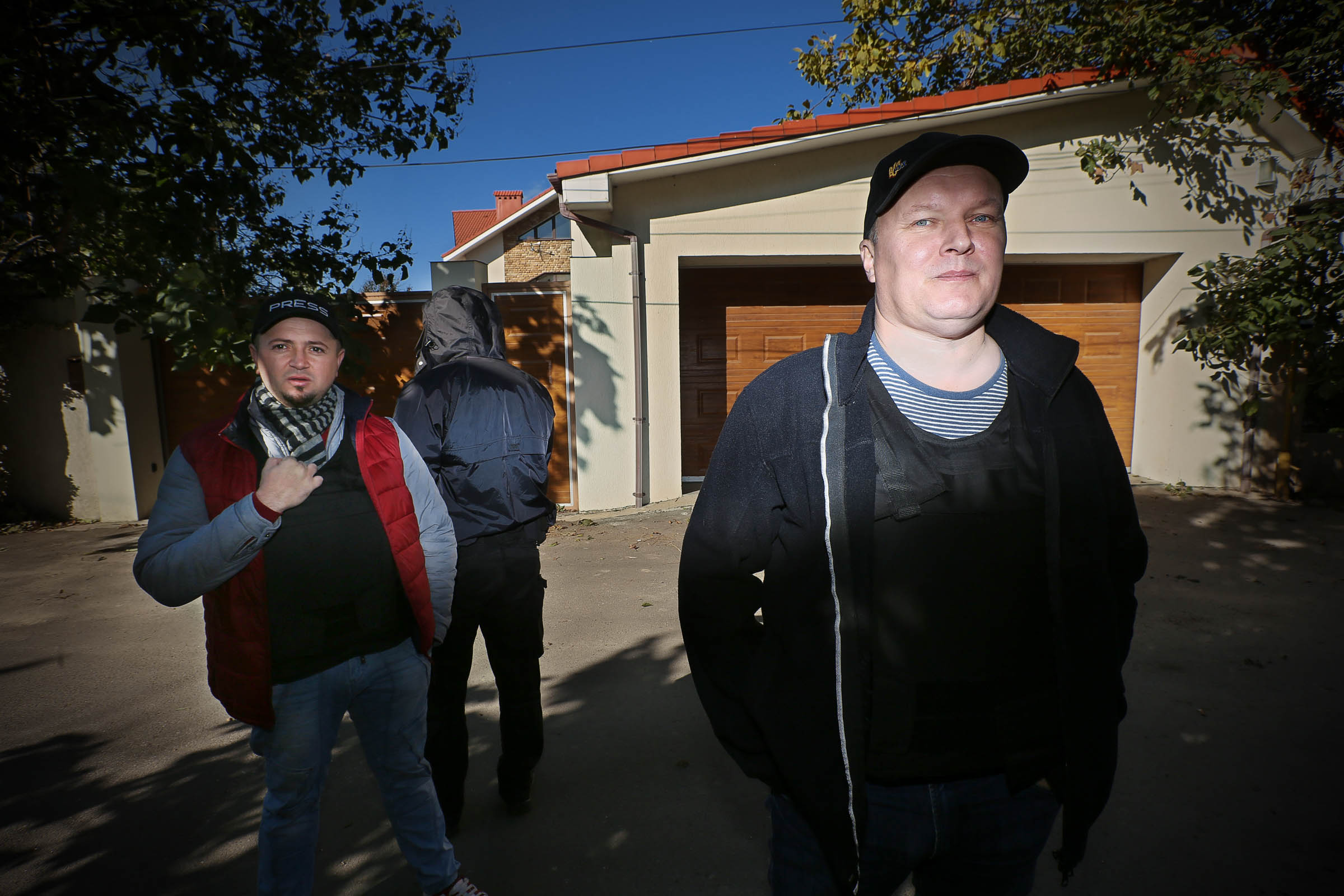
Journalist Grygoriy Kozma (L) and Mykhailo Kuzakon, leader of the Narodny Rukh of Ukraine party in Odesa (R), stand in front of Kuzakon’s house, at a place where a truck hit Kozma’s car on Aug. 2, a case which police are investigating as an assassination attempt. A state-provided bodyguar stands between them seen from his back. (Kostyantyn Chernichkin)
A few minutes later, Kozma understood why the man had warned the children away from the road: a truck roared up at a high speed, heading straight for his car. Kozma jumped out of the vehicle an instant before it was hit by the truck and slammed into a tree.
Kozma ran away. Looking back, he saw the driver of the truck running away. He also noticed the two men he saw earlier standing together and talking like they knew each other.
“Then I realized that the truck driver hadn’t made a mistake and it had in fact been an attack,” Kozma said.
He took out his rubber bullet pistol and fired two shots at the group. He realized they likely also had guns, so he ran back to his car.
On Aug. 3, the police reported they had arrested three suspects. They were charged with attempted murder and an attack on a journalist. According to police, the attackers were angered by articles that Kozma published.
“I asked one of those arrested at the court hearing which part of my work had made him so angry that he wanted to kill me. And he answered that he has never seen me before and wasn’t aware of my work,” Kozma said.
Kozma and Kuzakon say they had received threats from deputies of Trukhanov’s faction in the city council. Both are certain that Trukhanov’s people were behind the attack as a reprisal for several investigations, including one looking into the murky purchase of a former building of the Krayan engineering plant.
The Odesa City Council bought the Krayan building in 2016. Later the National Anti-Corruption Bureau of Ukraine or NABU has charged Trukhanov and several other city officials of stealing Hr 185 million (about $7.4 million) from the city budget when purchasing the building through a fictitious company. Kuzakon and other activists are the plaintiffs in the Krayan case, which is currently being heard in Odesa.
Vitaliy Ustymenko
In the late afternoon of June 5, Vitaliy Ustymenko, the head of Odesa branch of the Avtomaidan civic movement, walked out of the Suspilne TV company offices to buy some water. Ustymenko, who is also a member of a civic watchdog overseeing the National Anti-Corruption Bureau of Ukraine, at that time hosted a TV talk show on the channel.
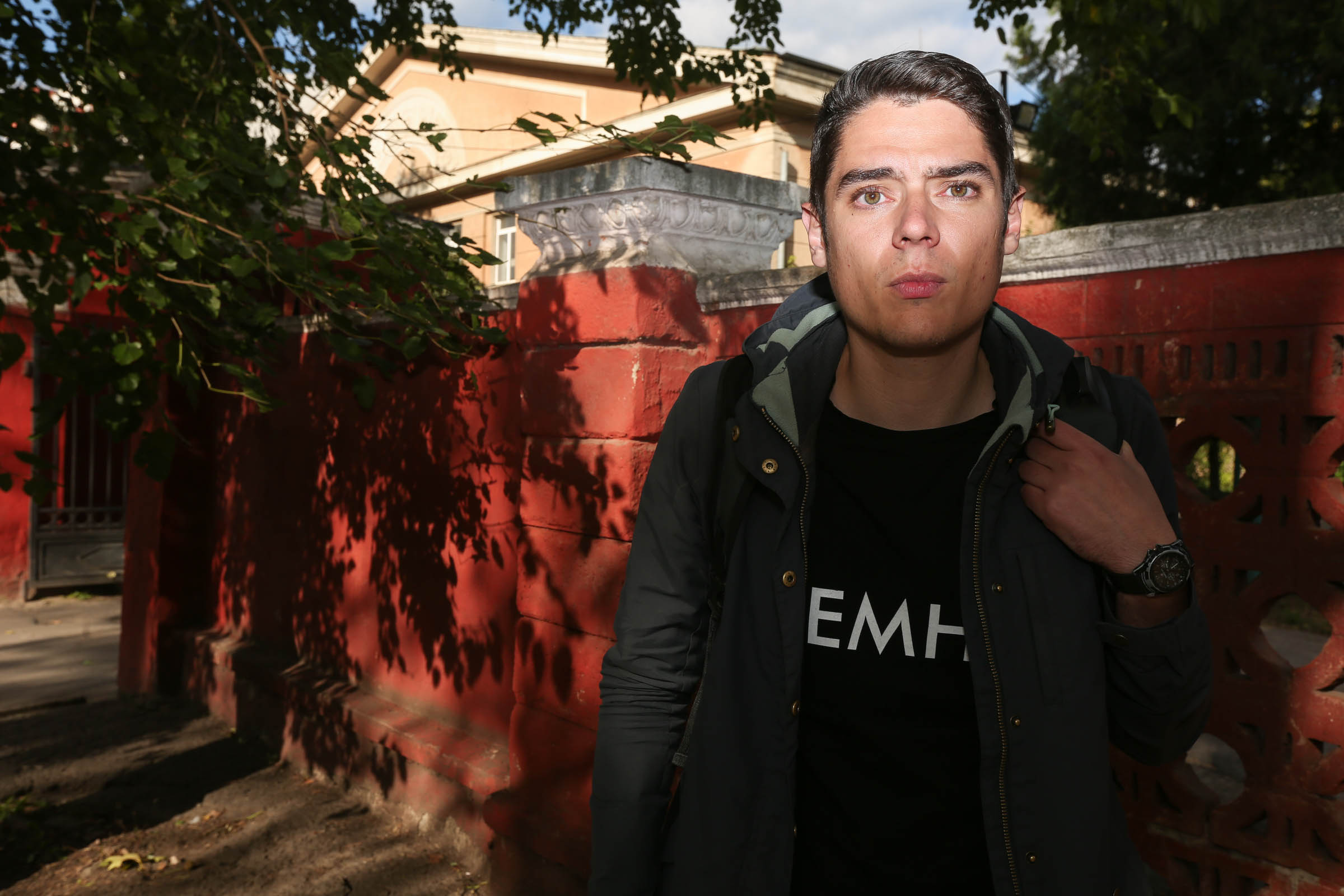
Vitaliy Ustymenko, head of Odesa branch of AutoMaidan, stands by the building of Suspilne TV company in Odesa, where two thugs stabbed him with an improvised knife on June 5. (Kostyantyn Chernichkin)
Suddenly, two thugs approached him and started stabbing him in the head with a homemade knife. Then they knocked him down, stabbed his hip and left him bleeding.
Seeing the attack, one of Ustymenko’s colleagues from the TV channel ran up to the attackers and scared them away. Ustymenko survived, and his head wounds were stitched up. Police are investigating the incident as an assassination attempt.
Ustymenko, 25, who spends most of his time organizing protests against illegal construction, says he is sure the attackers were commissioned by Trukhanov’s team.
“This is the group we mostly protest against — the dominant one in the region. This is the group of Trukhanov and Galanternik,” Ustymenko said. “You could call it an international mafia.”
Ustymenko is used to scuffles and threats.
On Oct. 4, when the Kyiv Post interviewed him, he confronted thugs who were guarding an illegal construction site near Lanzheron, a beach near the city center. He later clashed with police officers who tried to arrest one of the activists participating in the protest.
The controversial construction work near the beach is being carried out by the company of Andriy Kyslovsky, a local deputy from Trukhanov’s faction, Ustymenko said. It is the same site at which Mykhailyk had been protesting on the day he was shot.
In late September, the State Architectural and Construction Inspectorate of Ukraine banned construction at this site, but this decision hasn’t stopped the work.
On Sept. 25, local prosecutors announced the arrest of Ustymenko’s attackers. They turned out to be former war veterans who have never lived in Odesa. Although they deny being the attackers, Ustymenko recognized one of them.
However, he says the police are not looking for those who ordered the attack, and he fears there will be more violence.
“They’re trying to scare us off and show civil society that the attacks will continue and nobody will investigate them properly,” he said.
Svitlana Pidpala
On a sunny Saturday afternoon on June 24, 2017, journalist and environmentalist Svitlana Pidpala was heading home, carrying toys she bought for her daughter. When she reached her street in Odesa’s quiet downtown, a man called out to her. When she turned, he attacked her with pepper spray.
He then grabbed the blinded Pidpala and started beating her.
“He hit me on my head, my teeth, the back of my neck. The bruises were everywhere,” Pidpala, 50, remembers. When a passerby approached, the attacker ran away.
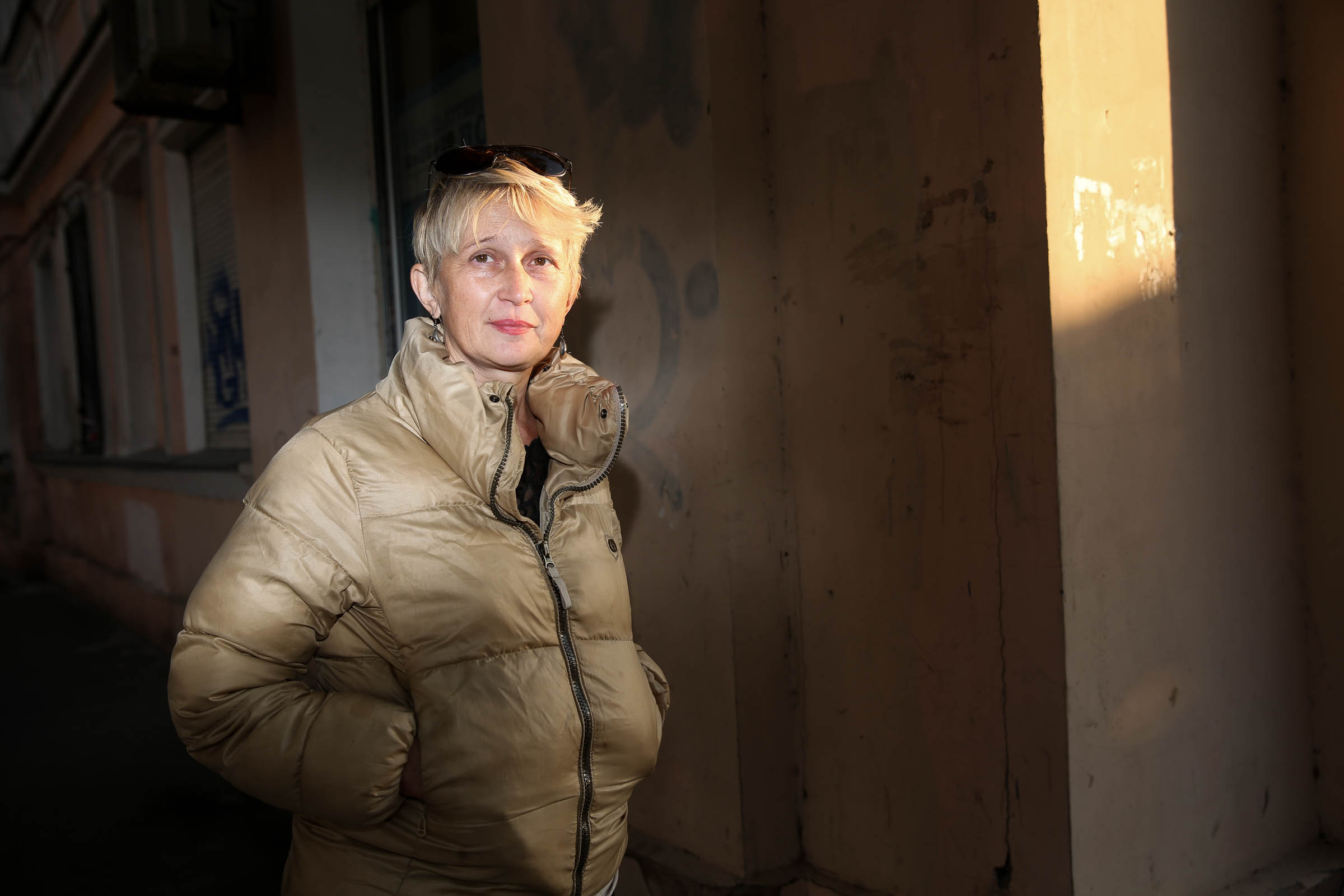
Environmentalist Svitlana Pidpala stands by a house in Odesa where a man attacked her with pepper spray and beat her on June 24, 2017. (Kostyantyn Chernichkin)
Police reported on Oct. 19, 2017, that they had arrested the attacker, who turned out to have seven earlier convictions for car hijacking and robbery. The man admitted to the attack, but said he had confused Pidpala with his former employer, a woman who owed him money.
Pidpala doesn’t believe this. Instead, she says the attack was ordered.
At that time, Pidpala was investigating two construction sites — one that could damage the city’s botanical garden and another that involves illegal dredging work. Both projects are linked to Galanternik’s businesses, Pidpala said. She added that the man who drove the getaway car for her attacker was linked to the security service of the construction sites.
“These are gangster methods. Everybody knows in our city that Galanternik often uses them,” Pidpala said. She added that she had given the police information about the two construction sites and the names of people linked to them, but she doubts the police will do anything.
Pidpala’s case was sent to court last year, but has been stalled for months because the judge presiding over the case has been changed. Pidpala fears the case will drag out until the statute of limitations has passed.
Liliya Leonidova
Liliya Leonidova, 42, a member of the Odesa City Council, was attacked earlier on the same day as Pidpala, on the morning of June 24, 2017.
She had just entered a food market when two athletic men in shorts and caps stood in her way and warned: “Watch what you’re doing, bitch.”
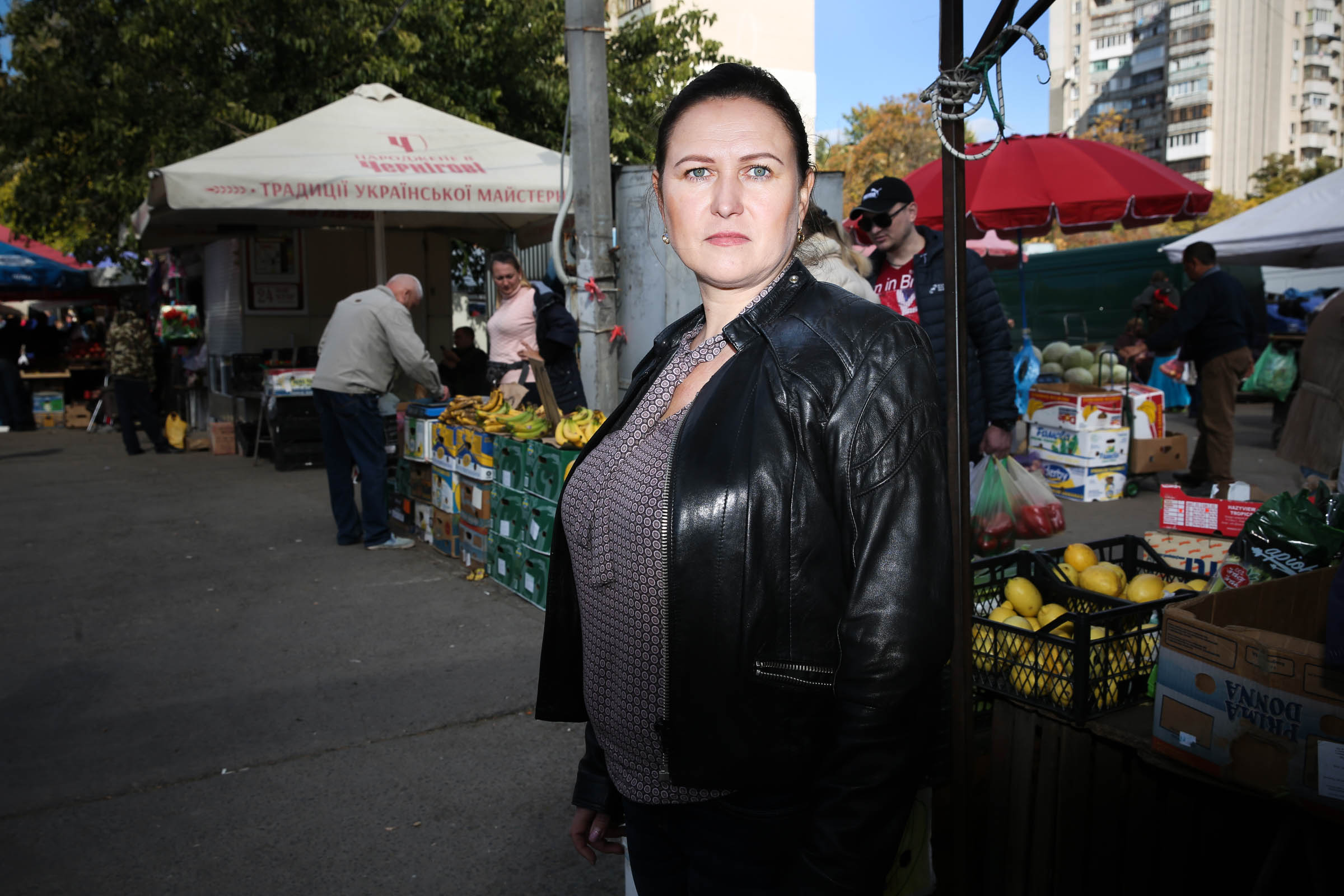
Liliya Leonidova, a deputy of Odesa City council, stands at a market in Odesa, where two unknown men attacked her on June 24, 2017. (Kostyantyn Chernichkin)
Then they each grabbed one of her arms and threw her to the ground, warning that “next time it will be worse.” She suffered several bruises and a fractured wrist.
Leonidova is a member of the Bloc of Petro Poroshenko faction in the council, but unlike the rest of her faction, she opposes Trukhanov’s team.
Before she was attacked, Leonidova had been investigating the municipal enterprise Reklama, which controls outdoor advertising in Odesa. She had found that the city budget did not receive up to 70 percent of the money Reklama should have earned.
In August 2017, Leonidova herself appeared in outdoor advertising. Someone had photoshopped her face onto a picture of a woman sleeping drunk in a car and used it in a series of advertisements. The ads carried the slogan “The recreation of deputy Leonidova.” Then, in October 2017, more ads appeared — this time of a woman with Leonidova’s face waving a Russian flag.
Leonidova believes the attack and smear campaign were payback for her criticism of Trukhanov. A former restaurateur, Leonidova said she has no enemies related to her previous business activity.
She said that the annual city budget of Hr 10 billion (about $355 million) would be twice as big were it not for the misuse of funds. “And a large part of this (remaining) Hr 10 billion is spent on kickbacks,” she said.
Pidpala said Leonidova often cooperates with activists by leaking them development plans approved by the city council.
Iurii Diachenko
Civilian monitor and activist Iurii Diachenko knows well how secretive the Odesa City Council can be. Diachenko, 28, who also heads the local branch of the DemAlliance political party, regularly monitors sessions of the city council — and is regularly attacked.
“The mayor personally threatened me during one session,” he said.
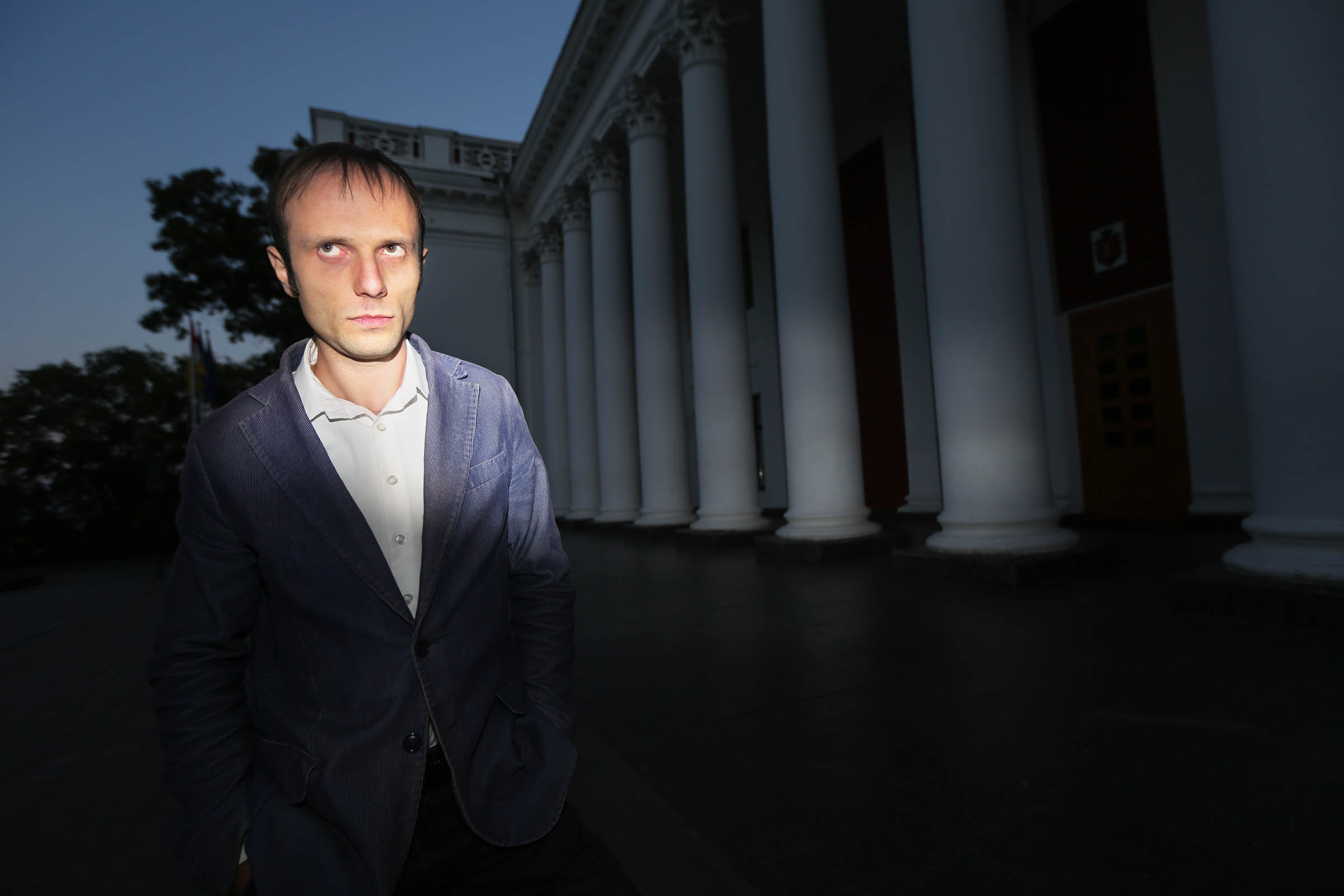
Iurii Diachenko, head of Odesa branch of the DemAlliance party, stands by Odesa City Council, where he was attacked by guards four times when trying to enter the building to attend sessions. Iurii Diachenko, head of Odesa branch of the DemAlliance party, stands by Odesa City Council, where he was attacked by guards four times when trying to enter the building to attend sessions. (Kostyantyn Chernichkin)
Diachenko said has been attacked in or near City Hall four times — punched by police and National Guard officers, or by officers of the Municipal Guard, a special municipal security service controlled by the mayor.
However, police have only responded to one attack on him, which occurred on June 14, 2017. A bodyguard from a private firm was charged of the attack and could be fined $30.
Despite the law allowing citizens to attend sessions of the city council, in Odesa security guards often refuse to let even journalists and political activists enter City Hall.
Diachenko said the Municipal Guard, a paramilitary organization that performs police functions and that has up to 300 members, is illegal and serves as the mayor’s private security group.
In September, the Organization for Security and Cooperation in Europe said in a report that the Municipal Guard in Odesa poses a threat to democracy. It mentioned a case in which members of the Municipal Guard had kidnapped and threatened journalist Myroslav Bekchiv.
Pro-Russian force
In 2014, Russian agents tried to stir up violence and separatist sentiment in Odesa, as they had done in the eastern Donbas oblasts of Donetsk and Luhansk.
Odesa fought back, forcing Russia’s retreat. But in one tragic confrontation, 48 people were killed in fighting and by a fire at the city’s Trade Unions Building on May 2, 2014.
Now activists say that while Ukraine won the battle, Russia is in danger of winning the war — with pro-Russian forces ensconced in City Hall.
Journalists revealed in 2016 that Trukhanov has Russian citizenship and owns several offshore companies registered at his Moscow address.
Information about Trukhanov’s Russian passport can be found on the website of Russia’s Federal Tax Service. Nevertheless, Trukhanov has denied the accusations, calling them “rumors and lies.”
Kuzakon said Trukhanov is also linked to Russian business through the Russian oligarch Aleksandr Zhukov, a partner of Angert and Galanternik — as is documented in the Italian police dossier. “Odesa is under threat because it’s under the influence of Russian money and Russian criminality,” Kuzakon said.
However, Trukhanov has managed to build friendly relations with President Petro Poroshenko, whose party is an ally of Trukhanov’s party in the Odesa City Council. Activists say Poroshenko hopes to keep Odesa under control and also bolster his electoral fortunes in the city this way.
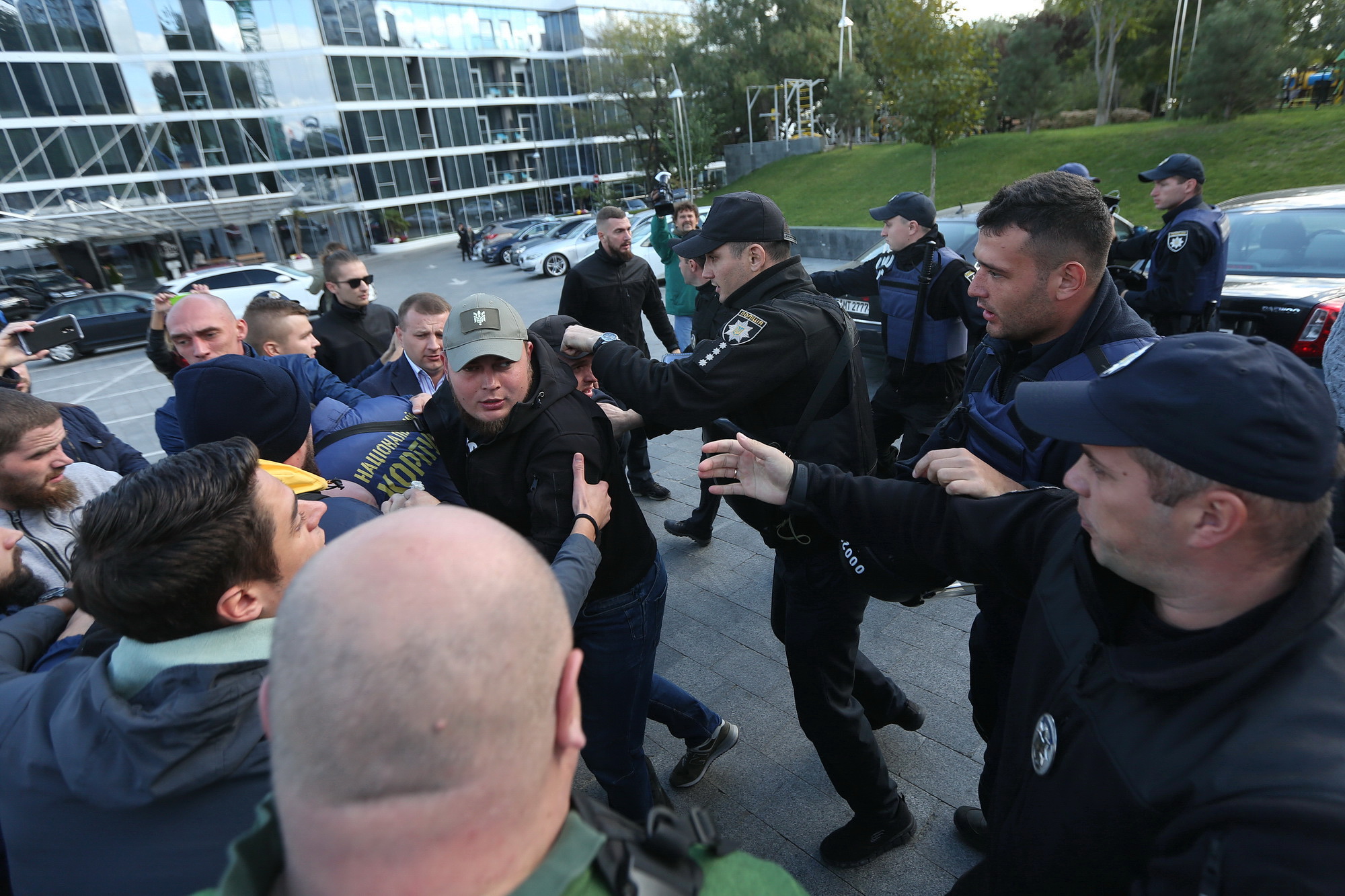
Activists clash with police on Oct. 4, 2018, in Odesa while protesting against illegal construction near Lanzheron, a beach not far from the center of the city. (Kostyantyn Chernichkin)
The court case on fraud involving the purchase of the former Krayan building, which NABU launched against Trukhanov and four other municipal officials, is now underway in Odesa. However, critics say Trukhanov controls the city’s law enforcement and has a high chance of being acquitted.
On Oct. 11, Mykhailyk came to the office of Odesa city prosecutors hoping to ask Prosecutor General Yuriy Lutsenko and Interior Minister Arsen Avakov, who were to visit the city, when the police and prosecution would find those who had ordered his murder. But Lutsenko and Avakov canceled their visit to Odesa on the same day.
Activists who were attacked say they don’t expect justice to come from the government in Kyiv.
“Nobody wants conflict with the regional elites before the elections,” Ustymenko said. “I’m afraid to imagine what will go on here during the elections.”
Kyiv Post staff writer Oleg Sukhov contributed to this story.
